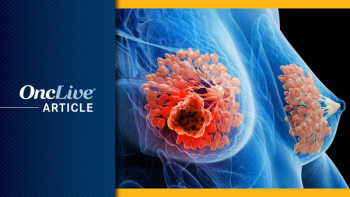
Plasma Testing for NSCLC EGFR & ALK Mutations
Transcript:
Geoffrey R. Oxnard, MD: When I’m testing for resistance, I’m always looking for the driver mutation. I want to know, is there any evidence of the tumor in the specimen? And so, you do an adequacy assessment by looking for the L858R, for the exon 19 deletion, and for P3T mutations.
If you see tumor-derived mutations in the plasma but no T790M, that makes me a little more suspicious that there isn’t a T790M for that case, and maybe that’s the case where I can skip a biopsy. I’m worried about that a little bit though, right? T790M is a resistance mutation, so it’s subclonal. It’s only 10% of the DNA, let’s say. And so, you could have a low-level EGFR mutation and miss a T790M that’s below the limit of detection. That’s why, unless there’s a ton of DNA telling you, “Look, this was a great liquid biopsy and no resistance mutation was found,” my plan is still to go to a tumor biopsy as my alternative.
I will also say that I am retesting for resistance after osimertinib. In that instance, I’m asking, “Has the T790M gone away, and has some other resistance mutation emerged?” And those are instances where I will see the T790M vanish and a MET mutation emerge. Or, I will see a BRAF mutation emerge, or even KRAS mutations. So, if it’s osimertinib-resistant, you can again look for new resistance mutations that might give you new targeted therapy options after osimertinib as an alternative to chemotherapy. And while I still have a tension between rapid EGFR tests versus broad NGS panels for each of my patients, I do know that the NGS panel creates the greatest diversity of testing and allows you to look for the most possible targets for your patients.
I will say that we are still learning about the complexities of drug resistance. I even had a patient where, after resistance to an EGFR inhibitor, NGS found an ALK rearrangement and I was able to target that. And so, we are discovering that the more you dig for alternate resistance mutations, the more you can find a potential range of targeted therapies for your patients. Some of those lead to clinical trials. Some of those, maybe, can’t be targeted right now, but I think with time we’ll be able to increasingly personalize resistance therapy using smart combinations and continuing to create treatment strategies that suppress resistance and avoid the need for chemotherapy.
We’ve now adopted this approach in EGFR where we’re always looking for resistance mutations and looking to target them. Does that same model now apply with ALK, where we have great ALK inhibitors? We have a range of complex ALK resistance mutations emerging, and we perhaps can use those resistance mutations to pick the next step for our patients. And so, we are increasingly trying to study this. Find a resistance mutation, find a drug connected with that specific type of resistance, and then give them the right drug to overcome it. I think there is not a broad acceptance of that approach quite yet, but many investigations are trying to use that model of precision resistance therapy that we have for EGFR and apply it now in ALK, where our understanding of resistance is evolving and improving.
Sandip Patel, MD: In non—small cell lung cancer, the driver mutation that’s susceptible to ALK inhibitors is actually a fusion event. However, oftentimes, these assays will pick up point mutations in ALK that actually are non-driver mutations. So, a careful review of the liquid biopsy will be important to determine which mutations are actually clinically actionable, versus those that are just passengers and not pertinent to intervene on to help the patient. Another example of this are EGFR mutations in codons outside of exon 19 and 21. Various mutations in exon 18, 17, and 20 are in the EGFR pathway and the EGFR gene. However, these are not susceptible to EGFR inhibitors that exist to date. And so, a careful review of the biopsy report will often have annotation that discusses the specific mutation and whether targeted therapy is appropriate for this patient or not.
Transcript Edited for Clarity




































